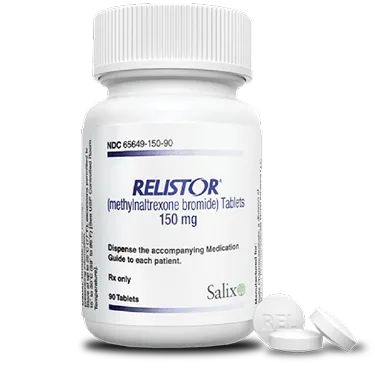IMPORTANT SAFETY INFORMATION
IMPORTANT SAFETY INFORMATION AND INDICATIONS
- RELISTOR tablets and injection are contraindicated in patients with known or suspected mechanical gastrointestinal obstruction and patients at increased risk of recurrent obstruction, due to the potential for gastrointestinal perforation.
- Cases of gastrointestinal perforation have been reported in adult patients with opioid-induced constipation and advanced illness with conditions that may be associated with localized or diffuse reduction of structural integrity in the wall of the gastrointestinal tract (e.g., peptic ulcer disease, Ogilvie’s syndrome, diverticular disease, infiltrative gastrointestinal tract malignancies or peritoneal metastases). Take into account the overall risk-benefit profile when using RELISTOR in patients with these conditions or other conditions which might result in impaired integrity of the gastrointestinal tract wall (e.g., Crohn’s disease). Monitor for the development of severe, persistent, or worsening abdominal pain; discontinue RELISTOR in patients who develop this symptom.
- If severe or persistent diarrhea occurs during treatment, advise patients to discontinue therapy with RELISTOR and consult their healthcare provider.
- Symptoms consistent with opioid withdrawal, including hyperhidrosis, chills, diarrhea, abdominal pain, anxiety, and yawning have occurred in patients treated with RELISTOR. Patients having disruptions to the blood-brain barrier may be at increased risk for opioid withdrawal and/or reduced analgesia and should be monitored for adequacy of analgesia and symptoms of opioid withdrawal.
- Avoid concomitant use of RELISTOR with other opioid antagonists because of the potential for additive effects of opioid receptor antagonism and increased risk of opioid withdrawal.
- The use of RELISTOR during pregnancy may precipitate opioid withdrawal in a fetus due to the immature fetal blood-brain barrier and should be used during pregnancy only if the potential benefit justifies the potential risk to the fetus. Because of the potential for serious adverse reactions, including opioid withdrawal, in breastfed infants, advise women that breastfeeding is not recommended during treatment with RELISTOR. In nursing mothers, a decision should be made to discontinue nursing or discontinue the drug, taking into account the importance of the drug to the mother.
- A dosage reduction of RELISTOR tablets and RELISTOR injection is recommended in patients with moderate and severe renal impairment (creatinine clearance less than 60 mL/minute as estimated by Cockcroft-Gault). No dosage adjustment of RELISTOR tablets or RELISTOR injection is needed in patients with mild renal impairment.
- A dosage reduction of RELISTOR tablets is recommended in patients with moderate (Child-Pugh Class B) or severe (Child-Pugh Class C) hepatic impairment. No dosage adjustment of RELISTOR tablets is needed in patients with mild hepatic impairment (Child-Pugh Class A). No dosage adjustment of RELISTOR injection is needed for patients with mild or moderate hepatic impairment. In patients with severe hepatic impairment, monitor for methylnaltrexone-related adverse reactions and dose adjust per Prescribing Information as may be indicated.
- In the clinical studies, the most common adverse reactions were:
OIC in adult patients with chronic non-cancer pain
- RELISTOR tablets (≥ 2% of RELISTOR patients and at a greater incidence than placebo): abdominal pain (14%), diarrhea (5%), headache (4%), abdominal distention (4%), vomiting (3%), hyperhidrosis (3%), anxiety (2%), muscle spasms (2%), rhinorrhea (2%), and chills (2%).
- RELISTOR injection (≥ 1% of RELISTOR patients and at a greater incidence than placebo): abdominal pain (21%), nausea (9%), diarrhea (6%), hyperhidrosis (6%), hot flush (3%), tremor (1%), and chills (1%).
OIC in adult patients with advanced illness
- RELISTOR injection (≥ 5% of RELISTOR patients and at a greater incidence than placebo): abdominal pain (29%), flatulence (13%), nausea (12%), dizziness (7%), and diarrhea (6%).
To report SUSPECTED ADVERSE REACTIONS, contact Salix Pharmaceuticals at 1-800-321-4576 or FDA at 1-800-FDA-1088 or www.fda.gov/medwatch.
INDICATIONS
- RELISTOR® (methylnaltrexone bromide) is an opioid antagonist. RELISTOR tablets and RELISTOR injection are indicated for the treatment of opioid-induced constipation (OIC) in adults with chronic non-cancer pain, including patients with chronic pain related to prior cancer or its treatment who do not require frequent (e.g., weekly) opioid dosage escalation.
- RELISTOR injection is also indicated for the treatment of OIC in adults with advanced illness or pain caused by active cancer who require opioid dosage escalation for palliative care.
To report SUSPECTED ADVERSE REACTIONS, contact Salix Pharmaceuticals at 1-800-321-4576 or FDA at 1-800-FDA-1088 or www.fda.gov/medwatch.
Please click here for full Prescribing Information for RELISTOR tablets and RELISTOR injection.


